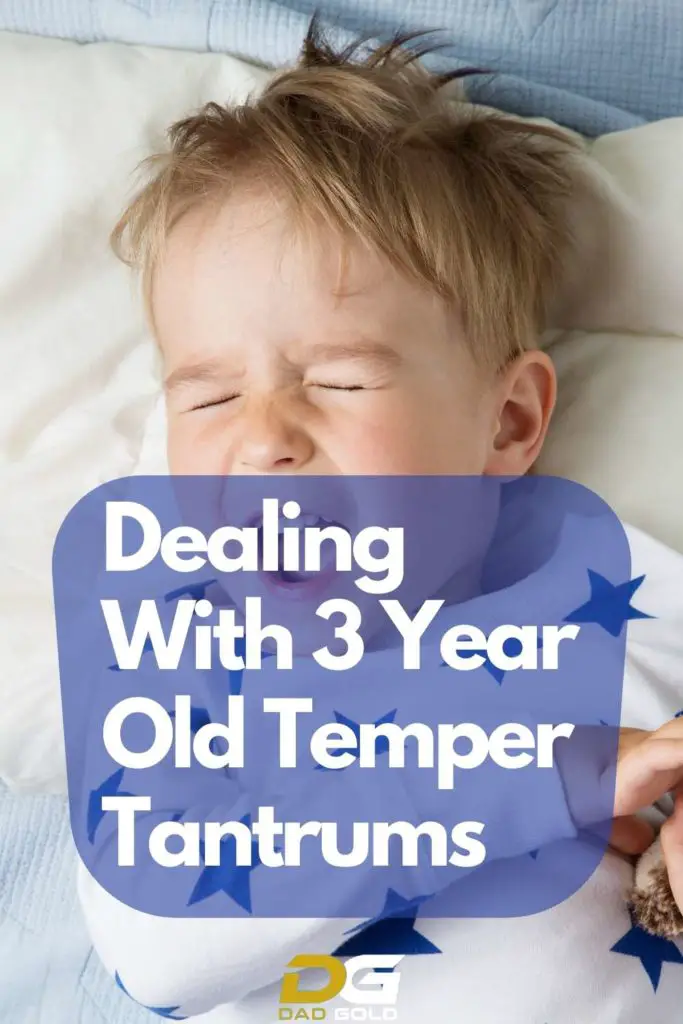Does your 3-year-old throw frequent temper tantrums?
Is constant screaming, breath-holding, crying, and whining driving you crazy?
Well, tantrums are fairly common in children between the ages of 1 to 3 and tend to peak at age 3.
Raising toddlers has its challenges. And this is one of the biggest!
Young children don’t know how to deal with the whirl of emotions constantly surrounding them. Having a tantrum is their way of showing their frustration and anger. While handling a tantrum can be frustrating for parents, tantrums in toddlers are a normal part of their development.
How do you deal with an angry toddler screaming at the top of their lungs? Read on, and I will take you through why your child throws tantrums and give you tips so that you can prevent, handle and discipline them.

Why Do Toddlers Have Tantrums?
Tantrums may happen for a myriad of reasons. The most obvious one is? Not getting what your child wants. For young children whose language skills are still in the early stages of development, tantrums are their way of expressing their emotions.
Toddlers don’t know how to deal with negative emotions like anger and frustration. They’re still getting the hang of managing these feelings. Sometimes they want to explore their growing independence and try to do things their way even though they’re too young to handle that.
-

Bold Male Pride – Baseball Trucker Cap Celebrating Masculinity
£18.00 Select options This product has multiple variants. The options may be chosen on the product page -

Dad Bod Appreciation Gift Mug
£14.00 Add to cart -

Dad Bod, Bad Jokes Structured Baseball Cap
£22.00 Select options This product has multiple variants. The options may be chosen on the product page
When they realize they can’t do it, it’s a tantrum city. Children also throw tantrums when they’re tired, hungry, bored, or overwhelmed. If your child is highly sensitive, you might experience temper tantrums more frequently than other parents.
5 Ways To Deal With 3-Year-Old Tantrums

You know you have to do something when your toddler throws a tantrum. But, what do you do? Here are some helpful tips that can ease the way for you.
Do a Quick Scan
Is your little one tired, hungry, scared, or overwhelmed? Is it past their mealtime or bedtime? Are they overstimulated? Are they kicking or hitting their siblings? Based on why they’re throwing a tantrum, you might need to put them to sleep, feed them, or physically remove them from the situation.
To Give In or Not to Give in?
It depends. Letting them stay at their friend’s house for a little longer isn’t going to hurt. But, allowing them another hour of iPad time to end the tantrum will reinforce the idea that tantrums work. If they want your attention, it’s best to ignore their behavior and calm them down.
Keep Your Cool
Parents are powerful role models for toddlers. So, you must stay calm when trying to handle a screaming toddler. If you lose self-control and get angry, the situation will get out of hand. Instead, take them to a safe environment and talk to them in a levelheaded manner.
Shift Attention Away
If your little one got frustrated because building the house of their dreams with the Lego sets didn’t go as planned, moving their attention away from that activity may help. If you’re in a grocery store and start a public tantrum, create a distraction and if that doesn’t work, take them to a quiet place.
Give Some Space
If your toddler hits, kicks, or throws stuff during a tantrum, immediately move them to a safe place. Make it clear that there will be zero tolerance for aggressive behavior. Please don’t take whatever they say during a tantrum personally. They’re just venting out their frustration.
After that, please don’t dwell on the tantrum or give the silent treatment.
How do you discipline a 3-year-old temper tantrum?

Throwing tantrums may be a normal part of growing up, but young children must learn self-control and boundaries. That’s why it’s important to discipline your 3-year-old temper tantrum.
Here are a few tried and tested discipline strategies to start.
Establish a Routine
Set boundaries and constantly reinforce them. Establish a daily routine and stick to their mealtime and bedtime. They need to understand that there will be consequences for negative behavior and rewards for positive ones.
Make Sure You Follow Through
If you keep making rules but don’t follow through with consequences for breaking them, you’ll lose credibility, and your toddler will soon get used to the idea that you make empty threats. So, give immediate consequences so that they can learn from their mistakes.
Use Timeout
Timeouts can be an effective tool to correct problematic behavior if used wisely. The standard rule is 1 minute of timeout per year of age. For example: Use a 3 minutes timeout for your 3-year-old. You can designate a timeout spot. Make sure not to use timeout too frequently.
Communicate With Them
Let them cool down, and then talk to them. Ask them what sets them off, listen to their feelings, and validate their emotions instead of being dismissive. Then teach them healthy ways to manage their emotions to communicate better next time instead of throwing a tantrum.
How to Avoid or Prevent a Future Toddler Tantrum?

While you can’t avoid or prevent all future tantrums, there are ways to experience fewer tantrums.
Avoid The Tantrum Triggers
Your child is less inclined to throw a tantrum when they’re well-fed and well-rested. If tantrums happen every time you tweak their daily schedule, try sticking to naptimes, bedtimes, and meal times instead. Don’t let them get too hungry, sleepy, or overstimulated.
Keep temptations out of sight.
To avoid power struggles with your toddler, hide off-limit things instead of leaving them around. For example: keep the candy bars out of sight if you’re trying to get them to eat veggies and put away the iPad and toys when you want them to do the homework.
Give Them More Choices
Let your child feel more independent and empowered by giving them more control over small decisions. Sure they’d have to do the homework but ask them what snacks they’d like and if they’d like them before or after the homework.
Prepare Them for Transitions
Give your kids time to prepare for a transition. Instead of snatching the iPad away when time is up, give a 5-minute warning even when taking it away at the designated time. Start a countdown or ring a bell. Make it fun and be consistent for them to catch up.
Avoid Overstimulation
It’s normal for children to throw a tantrum when they get overstimulated and tired. When there’s too much happening around your child, pick up on their cues. Move them away from too much noise and activity to help them unwind.
Give Your Child Attention
Does your child want your attention? Give it to them. Spend some one-on-one time before you let them play by themselves. Read them a book, answer their questions and give them lots of hugs and kisses.
Motivate Them to Learn Life Skills
Let them do age-appropriate chores like sorting and organizing stuff. Start small and give clear instructions so that there’s no misunderstanding. Praise your child’s efforts and give rewards for positive behavior.
Reason with your child instead of giving in, so they don’t believe tantrums get them whatever they want.
Conclusion
Tantrums should start to subside once your child is around 4 years old. Older children learn how to manage their emotions better, resulting in fewer tantrums. So, don’t worry too much about it.
However, don’t hesitate to talk to your pediatrician if your emotional toddler throws frequent temper tantrums, gets violent, and is at risk of self-harm or harming others.



